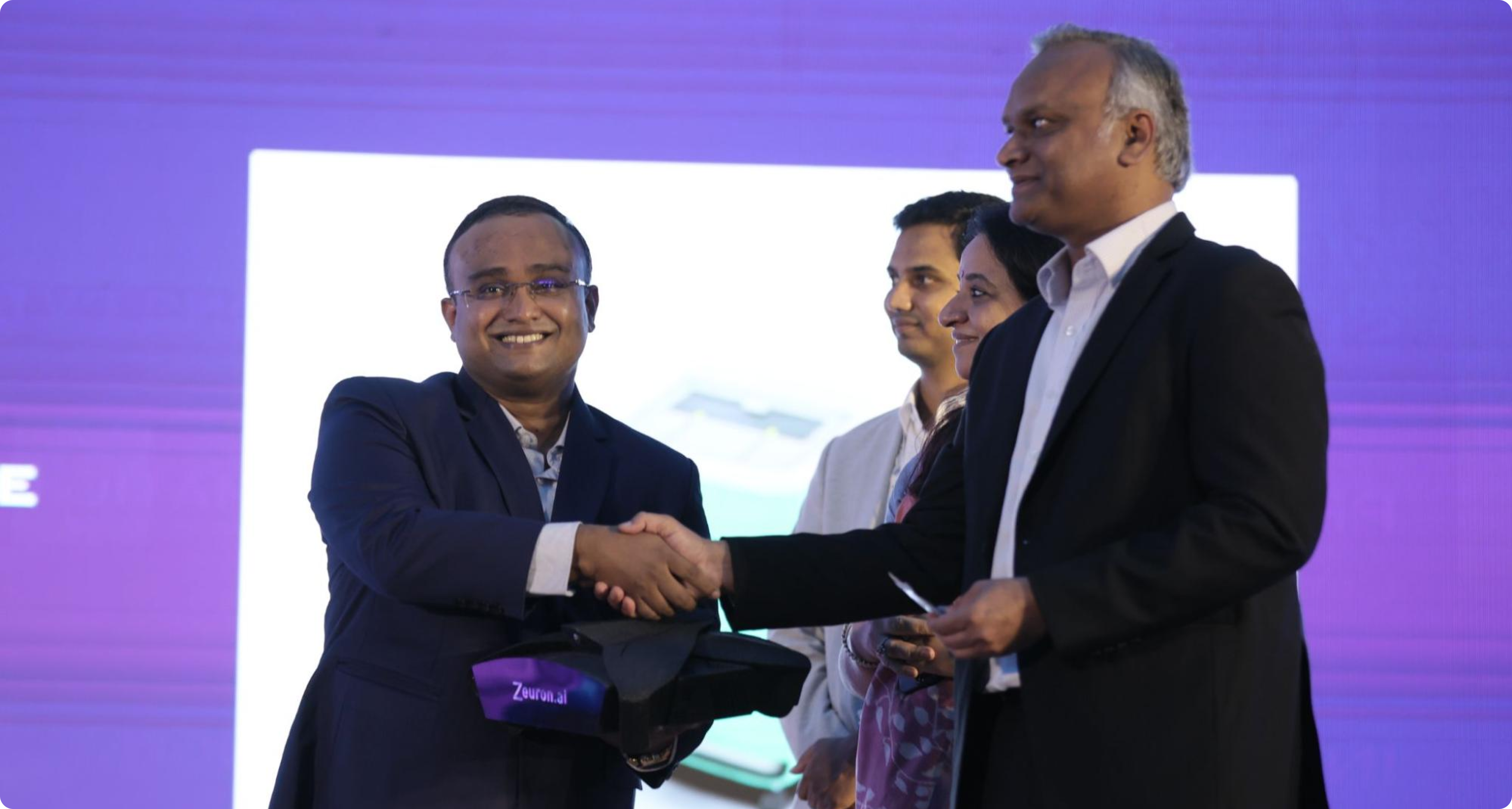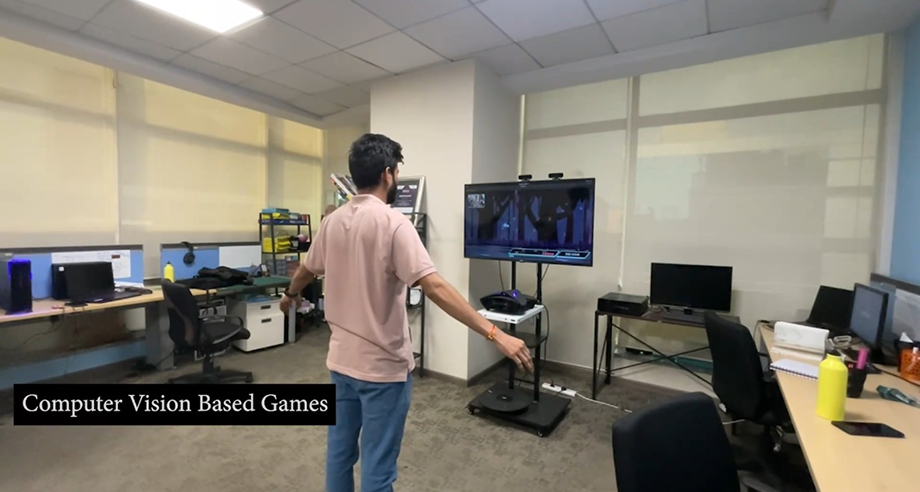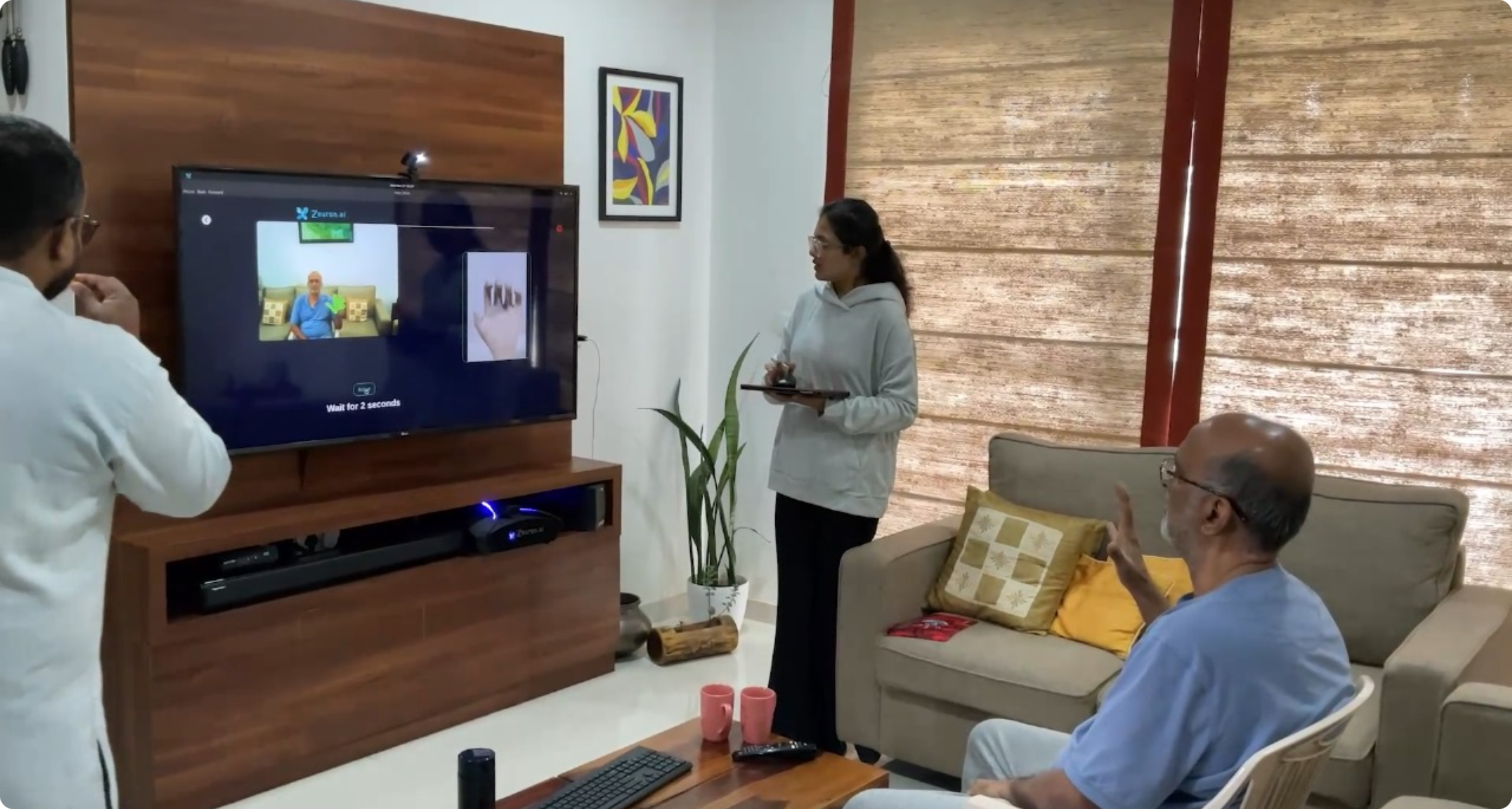How Zeuron AI Is Using Gaming to Decode the Human Brain
1. How do you see gaming as a force for good-especially in health, education, and well-being?
Gaming as a Force for Good. Most people see gaming as an escape. I see it as engagement, the most natural form of learning the brain knows. When we play, the brain comes alive. It processes information, makes decisions, and rewires itself faster than in any classroom or clinic. That’s why gaming has a role far beyond entertainment.
In health, it turns therapy into something joyful.
In education, it makes learning an adventure instead of a chore.
In well-being, it helps us fight stress, rebuild confidence, and reconnect with ourselves and others.
 MiMo: India’s first neuro-compute console turning therapy into play.
MiMo: India’s first neuro-compute console turning therapy into play.
At Zeuron, we build on this belief. We design games that don’t just entertain—they train the brain. Our console, MiMo, blends neuroscience, AI, and play to improve cognition, movement, and emotional resilience. Every game is not just a challenge; it’s a dialogue between the player and their own mind. We call this neurocompute, because it’s not just a device running a game. It’s your brain running its own upgrade.
For us, gaming is not a distraction from life. It’s how life becomes stronger, sharper, and more joyful.
2. What was the personal story or moment that led to the creation of Zeuron AI, and how did the idea evolve from footwear to a gaming console?
The Story Behind Zeuron: From Footsteps to Brainwaves. The story of Zeuron didn’t start with circuits or code. It began with a fight.
My mother was living with diabetic neuropathy, a cruel condition that slowly steals sensation from the feet. Imagine walking on clouds you cannot feel, or stepping on stones you don’t sense. Every step became uncertain. She stumbled often. She feared falling. And over time, fear replaced movement. And movement is life.
At the same time, my grandmother had slipped into dementia long before I was born. One day, she wandered out of the house and never returned. There were no answers, only questions. “Why can’t we understand what’s happening in the brain? Why can’t we do more?”
Those questions pushed me into action. During my master’s, I built a device to help my mother feel the ground again. It was simple in design but powerful in effect—footwear that used neuromodulation to wake up the nerves and restore sensation. For her, it worked. For many patients, it worked. That device became Fyrsta Innovations, my first startup. We tested it with over 300 patients and sold 75 units. It gave people their steps back, their confidence back. But success in science isn’t always business success. Hardware was hard to scale. The company couldn’t survive. Closing Fyrsta was heartbreaking, but it opened my eyes.
I realised something crucial: I had been treating the symptom, not the source.
The source wasn’t just in the feet. It wasn’t just nerves.
The source was in the brain - how it processes signals, how it reacts to stress, how it adapts or fails to adapt. If I wanted to change outcomes, I needed to work with the brain itself.
That shift in perspective changed everything.I began exploring how to monitor and train the brain through its most natural interface—movement. What if we could design something that not only senses how the brain controls the body but also teaches the brain to get better? That question led to the concept of neurocompute, technology that reads, learns, and responds to the brain’s decisions in real time.
The solution took shape not as a medical device, but as something far more engaging: a gaming console. Why gaming? Because when we play, the brain is at its best. It learns, rewires, and heals faster than under any forced therapy. Gaming takes away fear, boredom, and resistance. It replaces them with joy.
That’s how footwear became MiMo, a console where every game is therapy, and every therapy feels like play.What started as a way to help my mother walk again has grown into a way to help thousands train their brains, regain control, and rediscover joy.
 vision to spotlight — MiMo takes center stage at Bengaluru Tech Summit 2024
vision to spotlight — MiMo takes center stage at Bengaluru Tech Summit 2024
3. How exactly does your gaming console work—what makes it “neurocompute”-based, and how is it different from traditional therapy or gamification tools?
MiMo is not just another therapy tool wrapped in a game. It’s built on something we call neurocompute, technology that doesn’t just run games but learns how your brain and body work together, moment by moment. Every time you play, MiMo is listening, silently mapping how you move, how you react, how you decide. It’s not just counting scores; it’s reading the patterns behind them, the split-second choices your brain makes under pressure, stress, or fatigue.
The Brain in Action
Think about catching a ball.
It feels simple, but it’s a miracle of computation.
Your eyes track its speed and direction.
Your brain predicts where it will land.
Your muscles fire in perfect sequence to move your hand at just the right time.
All this happens in the blink of an eye.
Now imagine if you could measure that dance between perception, decision, and action, and then train it to get better. That’s exactly what MiMo does.
 Break time = Brain time. Thanks to MiMo
Break time = Brain time. Thanks to MiMo
Healing Through Play
The games on MiMo are deceptively fun. They challenge your mind, focus, memory, and decision-making. They challenge your body's balance, coordination, and reflexes. They even touch your energy systems, building endurance and resilience.While you play, MiMo is capturing how your brain controls your body, and where those connections need strengthening. The magic lies in how it adapts.
If your brain hesitates, MiMo notices and lowers the challenge, just enough to help you push through.
If you’re improving, it raises the stakes, keeping your brain growing stronger with every move.
See MiMo in Action: Cerebral palsy kid using MiMo
Why It Feels Different
Traditional therapy feels like work—boring repetitions, slow results. Gamified therapy tries to add fun to that repetition, but only on the surface. MiMo is different because it isn’t therapy pretending to be a game. It’s a game that is therapy.
It taps into the brain’s natural love for play, using joy as the engine for healing. And because every move is tracked, families and clinicians get real-time insights to guide progress. With MiMo, therapy stops feeling like an obligation.It becomes something people look forward to because when the brain is happy, the brain heals faster.
4. Can you share a few real-life stories or examples of how Zeuron AI has helped patients with conditions like Parkinson’s, PCOD, or childhood developmental delays?
Behind every sensor and line of code in MiMo are people whose lives have changed in ways big and small. Here are just a few stories, names have been changed to protect their privacy, but their journeys are real.
Arjun – Winning His Fight with Diabetes
Arjun, 36, had been living with diabetes for years. His HbA1c was stuck at 11 despite medication, and his weight had climbed to 118 kilos. Everything felt like a losing battle—until he started using MiMo.
Three weeks into playing, something shifted. His energy levels rose, his stress dropped, and his body started responding. Over 16 months, his weight dropped steadily to 80 kilos. His HbA1c fell to 8, without crash diets or aggressive regimens. It wasn’t just about numbers—it was about regaining control, one joyful session at a time.
Mr. Iyer – A Parkinson’s Patient Who Invested in Hope
Mr. Iyer, 62, had Parkinson’s. The tremors made daily life hard and stole away his confidence. He started using MiMo under the guidance of his therapist. Four months later, his tremors had reduced, his movements were smoother, and his outlook brighter. He didn’t just become a believer—he became an investor, helping take MiMo to others who needed it.
 Parkinson’s therapy in action: MiMo, the AI-powered neuro-compute console transforming neurodegenerative care
Parkinson’s therapy in action: MiMo, the AI-powered neuro-compute console transforming neurodegenerative care
Rohan – A Kid Finding His Balance
Rohan, a young child on the autism spectrum, struggled with trunk and neck control. Simple movements were exhausting and play often turned into frustration. When he began sessions with MiMo, the change was gradual but profound. The games engaged him, encouraging him to interact, hold his posture, and enjoy movement. Today, he laughs during therapy—something his parents hadn’t seen in months. His journey has just begun, but joy has already found its way back.
These are only a glimpse of what we see every day.
There are many more stories, each unique, each powerful, where MiMo has turned therapy into something families look forward to, and healing into something that feels like play.
5. What are some of the biggest challenges you've faced in helping people understand this technology, and how are you trying to overcome them?
When you build something the world hasn’t seen before, the biggest challenge isn’t in the code or the hardware, it’s in hearts and minds. At first, people didn’t know what to make of MiMo. To many, gaming is a pastime, not a pathway to healing. Therapy, they believed, had to be slow, repetitive, and serious. The idea that joy itself could be therapeutic? That was hard to swallow. Convincing families meant showing them, not telling them. The first time a child on the spectrum laughed mid-session, their parents didn’t need more data—they understood. But getting to that moment takes time.
Doctors and therapists had their own questions. Would this replace traditional care? Was it just another gadget? We had to earn their trust, step by step. We invited them to play, to watch, to measure the results for themselves. Slowly, skepticism turned into curiosity, and curiosity into belief.
There were misconceptions everywhere. Some thought MiMo was just gamification—fun without depth. Others assumed it was too complex for home use. The reality is the opposite: MiMo is simple to use, deeply intelligent, and designed to heal through play.
How We’re Changing the Narrative
We started partnering with clinics, schools, and hospitals so people could experience MiMo where it matters most, where healing begins. Therapists became our allies, blending MiMo’s joy with their expertise. Communities heard the stories of transformation, and walls of doubt began to crumble. Workshops, demonstrations, and research backed with evidence—all of it helps shift the way people think about brain health.
Every story we share is another step toward acceptance. Every life touched is proof that technology can care. And with each success, we move closer to a world where therapy feels less like treatment, and more like life itself.
6. Where do you see Zeuron AI heading in the next 3–5 years, and what role do you believe it can play in reshaping brain health and wellness in India and beyond?
When we started Zeuron, the dream was simple: help one person heal. Today, that dream is growing, fast, wide, and deep. In the next 3–5 years, we see MiMo not as a niche device, but as a household name, changing how families, schools, and hospitals approach brain health. We envision a world where every child can train their brain as easily as they brush their teeth, where every elder has access to playful tools that keep their mind and body young, and where therapy no longer feels like therapy.
Scaling What Works
We’re building more than devices; we’re building an ecosystem. In the coming years, MiMo will expand into homes, schools, and hospitals across India and beyond. New games, smarter sensors, and deeper neurocompute intelligence will make every session more personal, more adaptive, and more effective. Partnerships are key. We’re working with clinics, therapists, and educators to integrate MiMo into rehabilitation programs, early childhood development, and preventive care. Each collaboration takes us closer to our vision of neuro-wellness becoming part of daily life, not just medical life.
Leading with India, Leading for the World
India has the talent and the heart to lead in healthtech innovation. Zeuron aims to stand at that intersection, where science meets empathy, and innovation meets impact. In the years ahead, we plan to contribute not just to technology, but to policy frameworks around neurodevelopment and mental wellness, ensuring these solutions reach those who need them most. This is just the beginning. Because every time a child laughs during therapy, every time an elder regains confidence to move, we’re reminded why we do this.
The next five years will be about scale, yes, but also about soul. We’re building not just products, but a future where brain health is not a privilege, it’s a promise.



Ready to create impact?
Our members benefit from exclusive access to resources, industry events, workshops, events, incubation & investment opportunities


